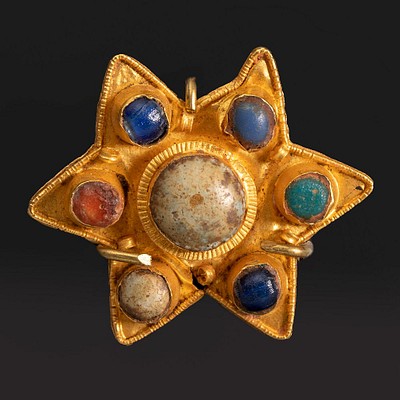ROBERT KEMM (Salisbury, England, 1837 - London, 1895). "The Northern Inn." Oil on canvas.
Lot 103
About Seller
Setdart Auction House
Carrer Aragó 346
Barcelona
Spain
Setdart Subastas was born in 2004 and is currently the first online art auction in Spain with solidity, prestige and reliability guaranteed by our more than 60,000 users. Setdart has a young, dynamic and enterprising team ready to successfully manage the purchase and sale of art works through custom...Read more
Estimate:
EUR€13,000 - EUR€15,000
$13,684.21 - $15,789.47
Absentee vs Live bid
Two ways to bid:
- Leave a max absentee bid and the platform will bid on your behalf up to your maximum bid during the live auction.
- Bid live during the auction and your bids will be submitted real-time to the auctioneer.
Bid Increments
| Price | Bid Increment |
|---|---|
| EUR€0 | EUR€10 |
| EUR€200 | EUR€25 |
| EUR€500 | EUR€50 |
| EUR€1,000 | EUR€100 |
| EUR€3,000 | EUR€200 |
| EUR€5,000 | EUR€500 |
| EUR€10,000 | EUR€1,000 |
| EUR€20,000 | EUR€2,000 |
| EUR€50,000 | EUR€5,000 |
About Auction
By Setdart Auction House
Dec 21, 2021
Set Reminder
2021-12-21 07:30:00
2021-12-21 07:30:00
America/New_York
Bidsquare
Bidsquare : Córdoba: 2,000 Years of Art
https://www.bidsquare.com/auctions/setdart-auction-house/c-rdoba-2-000-years-of-art-8049
Setdart Auction House sofia@setdart.com
Setdart Auction House sofia@setdart.com
- Lot Description
ROBERT KEMM (Salisbury, England, 1837 - London, 1895). "The Northern Inn." Oil on canvas. Presents stamp on the back alluding to the manufacture of the canvas. Signed in the lower left corner. Measurements: 76,5 x 101,5 cm. This work is conceived as a melting pot in which all the topics of the Spanish are amalgamated; the brown woman, the bullfighter, the religious and the bandit. All these characters come together in an interior that also breathes tradition through the ceramic pot, or the poster announcing a bullfight. During the 19th century, Spain and England maintained a special relationship. The valuable support given by Great Britain to the patriotic fervor against the French invader, led the Spanish to look with sympathy to the British. For their part, British painters and literati descended upon Spain, a country that offered them the quintessence of romantic idealism. Perhaps looking for a natural and more authentic landscape, they traveled to the peninsula, where the Industrial Revolution had not yet degraded the face of the landscape. Progress in communications made Spain an exotic, but at the same time close, destination for young English painters who rejected the industrial bourgeoisie and the poverty of spirit that was plaguing the large and ever-growing cities. In fact, after the War of Independence our country began to acquire an aura of exoticism and extravagance that attracted a good number of English intellectuals and artists. The Moorish Andalusia, the bandit, the obscurantist Church, the handsome bullfighter and the maja, the lady with mantilla, the barefoot children, the beggar full of rags, Cervantes' gitanilla... Paintings like the one we present here bring us closer to the essence of romanticism, to the exaltation of the soul as a response to an era that placed the cloth on the altar of Reason. To achieve this goal, Romantic painters stopped subordinating color to drawing, thus reproducing pictorial motifs with more expressive force and greater naturalism. The brushstroke becomes impetuous, the color reaches its autonomy, the impasto is thicker, etc. Son of the carver and gilder William Kemm, Robert Kemm's love for painting must have awakened very early, since he was only fourteen years old when he was registered in the census as an artist. During his early years Kemm produced two series of 256 watercolors of Wiltshire churches. Following his contemporaries J. Phillip, J. Bagnold Burgess and E. Long, Kemm made a trip to Spain in the years between 1946 and 1946. Long, he made a trip to Spain between 1861 and 1864, visiting Seville and Granada in particular. In the years preceding his first exhibition, Kemm devoted himself mainly to portraiture. His first exhibition at the Royal Society of British Artists took place in 1874. In this first exhibition Kemm already showed all the typical elements of his style, with works on Spanish themes. It is worth mentioning the presentation of several works by Kemm in the exhibition "English Romantic Painters in 19th Century Spain", organized in Zamora by Caja Duero in 1999, from a private Spanish collection. Robert Kemm is represented in the Fine Arts Museum of San Francisco, the Salisbury Museum, the Wiltshire Archaeological Society, the Sunderland Museum and the Museum of Sheffield, as well as in several important private collections.
- Shipping Info
-
In-house shipping available. Please inquire at admin@setdart.com.
-
- Buyer's Premium



 EUR
EUR CAD
CAD AUD
AUD GBP
GBP MXN
MXN HKD
HKD CNY
CNY MYR
MYR SEK
SEK SGD
SGD CHF
CHF THB
THB

















